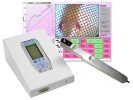Authors
X Peng, H Guo, J Chen, J Wang, J Huang
Lab
Department of Urology, Shanghai Jiao Tong University Affiliated Sixth People's Hospital, Shanghai, China.
Journal
The Prostate
Abstract
Background Chronic prostatitis/chronic pelvic pain syndrome (CP/CPPS) is an intractable problem of the urogenital system. The aetiopathogenesis and effective treatments for CP/CPPS are needed to be untangled. Pirfenidone is a molecule that exhibits anti_inflammatory, antifibrotic, and antioxidative stress capacities in a variety of animal experiments and clinical trials. This study was aimed to investigate the therapeutic effect of pirfenidone on CP/CPPS and to identify the mechanism responsible for it.
Methods A CP/CPPS model was induced in rats by intraprostatic injection of complete Freund's adjuvant (CFA). Blood and prostatic tissues were harvested for assessment after the administration of pirfenidone or vehicle for 4 weeks.
Results The findings revealed that pirfenidone significantly ameliorated chronic pelvic pain and inhibited prostatic inflammation and fibrosis. Further study found that pirfenidone suppressed the expression of proinflammatory mediators, including tumor necrosis factor__, interleukin_1_ (IL_1_), IL_6, IL_8. Pirfenidone exhibited a potent antioxidant capacity through improving the activities of glutathione, catalase, total superoxide dismutase, and reducing the production of malondialdehyde. Furthermore, pirfenidone also facilitated the polarization of M2 macrophages and suppressed the activation of the nuclear factor_kappaB (NF_kappaB) signaling pathway.
Conclusions Pirfenidone can exert a beneficial effect against CFA_induced CP/CPPS by anti_inflammatory, antioxidative, antifibrotic properties, and the function is mediated at least partly through the M2 polarization of macrophages and the inhibition of NF_kappaB signaling pathway. These findings suggest that pirfenidone holds promise as a potential therapeutic for the treatment of CP/CPPS.

 Pain - Thermal Allodynia / Hyperalgesia
Pain - Thermal Allodynia / Hyperalgesia Pain - Spontaneous Pain - Postural Deficit
Pain - Spontaneous Pain - Postural Deficit Pain - Mechanical Allodynia / Hyperalgesia
Pain - Mechanical Allodynia / Hyperalgesia Learning/Memory - Attention - Addiction
Learning/Memory - Attention - Addiction Physiology & Respiratory Research
Physiology & Respiratory Research
 Pain
Pain Central Nervous System (CNS)
Central Nervous System (CNS) Neurodegeneration
Neurodegeneration Sensory system
Sensory system Motor control
Motor control Mood Disorders
Mood Disorders Other disorders
Other disorders Muscular system
Muscular system Joints
Joints Metabolism
Metabolism Cross-disciplinary subjects
Cross-disciplinary subjects Preclinical studies and opioids: role in crisis management in the United States
Preclinical studies and opioids: role in crisis management in the United States 
